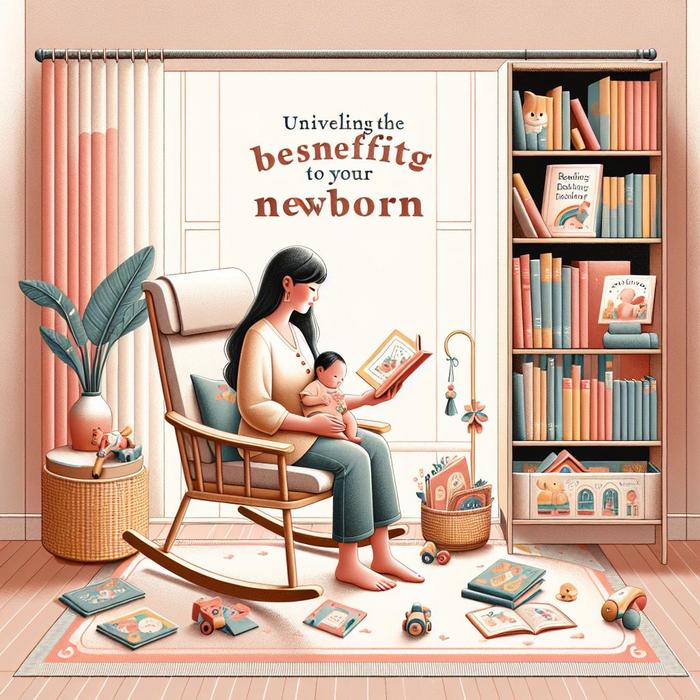Understanding Early Literacy
Reading to your newborn provides an abundance of benefits. Many parents wonder, “is there any benefit in reading to a baby?” Unquestionably, the answer is “yes”. Research shows that reading to babies supports the development of early literacy skills and establishes a love for reading that can last a lifetime. Let’s delve into how reading to your newborn can shape their early literacy journey.
The Impact of Reading to Your Newborn
There are numerous benefits of reading to your newborn, such as:
- Increased Bonding: It’s an excellent way to connect with your child.
- Introduction to Language: Your baby hears the sounds of words and sentence structure.
- Improved Cognitive Skills: Regular reading helps develop your baby’s concentration and memory.
- Emotional Development: Your baby learns about different emotions through the tone of your voice.
- Boosts Imagination: The stories introduce your little one to different worlds and characters.
Reading is not just about literacy; it’s also about building a strong bond with your baby. Alongside a stimulating home environment, regular reading can contribute to a stronger emotional connection between you and your baby.
Building Blocks for Early Literacy
From the time your baby is born, there are several key components that contribute to their development of early literacy skills. Reading aloud to your newborn is a key factor in this. Wondering why you should start reading to a 2-week old baby? The answer is simple – it sets the stage for language development.
Research supports this, demonstrating that reading to babies helps with language comprehension, expression, and vocabulary. Regular exposure to books and reading aloud helps babies understand the rhythm and structure of language, setting the foundation for reading and speaking skills.
How to Introduce Reading
The creation of a stimulating home environment is crucial for your baby’s development. Here are some tips to introduce reading from birth:
- Start Simple: Choose short, colorful books with big images.
- Read Regularly: Make reading a part of your daily routine.
- Involve Baby: Let your baby turn the pages when they are able to do so.
- Express Yourself: Use different voices for different characters; sing if you like!
- Discuss the Story: Although your baby doesn’t understand yet, it helps them associate words with pictures and events.
Embracing the Journey
Remember that reading is a journey, not a destination. It’s about creating a bond with your child and sparking their curiosity. Keep in mind, the importance of reading to babies and infants lies in the earliest stages of their development. While your baby might not immediately grasp the stories, they are picking up much more than you think!
Before you know it, they’ll be reaching for their favorite book and babbling along. So, let the joy of reading become a part of this wonderful journey. Always remember to balance this with a well-rounded approach to your baby’s health, including regular check-ups with your trusted pediatrician. The combination of these factors will set your child on a path of learning and discovery.
Tips for Managing Teething and Reading
Your baby’s teething stage can sometimes disrupt reading time. But don’t worry! Having teething toys at hand and offering more comfort during reading sessions can help. The benefits of reading to newborns far outweigh the occasional challenges, so keep going and watch as your baby grows and evolves in their journey towards literacy.
Reading to a Baby: When and How Often?
Knowing when and how often to read to your baby can make this experience more enjoyable and beneficial for both you and your child. According to Parents.com’s Age-by-Age Guide to Reading, it’s never too early or too late to start. Ideally, start from birth and aim to read for at least 10-15 minutes each day. Regularity is the key to developing your child’s love for books and enriching their language capabilities.
Choosing the Right Books for Your Baby
The choice of books also plays a crucial role in your baby’s early literacy development. Infant-friendly books are usually full of colourful pictures, patterns and simple words. As your child grows, gradually introduce books with sentences, rhymes and stories. Check out online platforms and local libraries for a wide selection of age-appropriate books for your baby.
Importance of a Reading-Friendly Environment
Creating a reading-friendly environment is as important as the act of reading itself. Choose a comfortable and quiet space for reading, free from distractions so that your baby can actively engage and concentrate. Make this reading corner enticing with a variety of books on an easily accessible shelf. Over time, your baby will associate this environment with positive emotions, enhancing their attention span and making reading a joyous activity.
Making Reading Interactive
Reading should not just be an activity where the parent reads and the baby listens. Include interactive elements to make the session more engaging and fun. For example, point to the pictures in books, and encourage your baby to do the same. Emphasize the sounds of the words and the rhythm of the sentences. Eventually, your baby will learn to mimic these sounds, which is a significant step towards early language development.
Take cues from Your Baby’s Actions and Sounds
Each baby is unique and will engage with books in their own way. Responding to your baby’s actions, sounds and interests while reading will make the session more interactive and impactful. This can be a delightful way to understand your baby’s preferences and inclinations. Hence, as per this Reddit discussion, understanding your baby’s actions can be the key to promoting early literacy.
The Role of Consistency
Just like any other habit, consistency with reading habits plays a key role in shaping early literacy. A long-term scientific study on Reddit has shown that daily consistent parental reading in the first years of a child’s life bears fruitful results in their literacy skills. This perseverance can enhance your baby’s cognitive development significantly.
The Verdict
In conclusion, reading plays an unparalleled role in your baby’s early literacy development. It is a delightful journey that helps your child develop cognitive, language, and emotional skills. Never underestimate the leaps of progress your baby is making through these reading times. Embrace this journey with patience and love, witnessing your baby’s individual development in their very own unique way.







